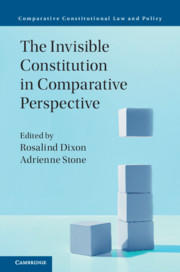Book contents
- The Invisible Constitution in Comparative Perspective
- Comparative Constitutional Law and Policy
- The Invisible Constitution in Comparative Perspective
- Copyright page
- Contents
- Contributors
- Part I Conceptualising the Invisible Constitution
- Part II The View from Asia Pacific and the Middle East
- Part III The View from Europe and North America
- 15 The Evolution of Natural Law in Ireland
- 16 “Additive Judgments”
- 17 Germany's German Constitution
- 18 Unwritten Constitutional Principles in Canada
- 19 Lost in Transition
- Index
18 - Unwritten Constitutional Principles in Canada
Genuine or Strategic?
from Part III - The View from Europe and North America
Published online by Cambridge University Press: 02 November 2018
- The Invisible Constitution in Comparative Perspective
- Comparative Constitutional Law and Policy
- The Invisible Constitution in Comparative Perspective
- Copyright page
- Contents
- Contributors
- Part I Conceptualising the Invisible Constitution
- Part II The View from Asia Pacific and the Middle East
- Part III The View from Europe and North America
- 15 The Evolution of Natural Law in Ireland
- 16 “Additive Judgments”
- 17 Germany's German Constitution
- 18 Unwritten Constitutional Principles in Canada
- 19 Lost in Transition
- Index
Summary
- Type
- Chapter
- Information
- The Invisible Constitution in Comparative Perspective , pp. 517 - 540Publisher: Cambridge University PressPrint publication year: 2018



